|
Saturdee
Opry Links # 101: Grab Bag Edition!
Saturdee Opry Links' fascinating, varied,
engrossing, uplifting, peculiar, mesmerizing selections are now available
for your ignorance, arrogance, and magnificence. Ten selections, plus
delightful and strangely named overture, plus encore. Russians! Forgotten
sopranos! Forgotten baritones named Apollo! (Well, one.) A nasty old witch!
An heroic African-American contralto of the past! Dean Martin! Sumi Jo! A
bad anthem by Puccini! A prayer from Tchaikovsky and Tolstoy! Thank you.
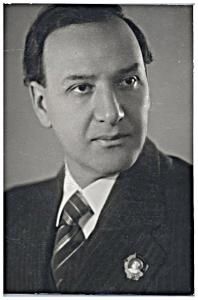 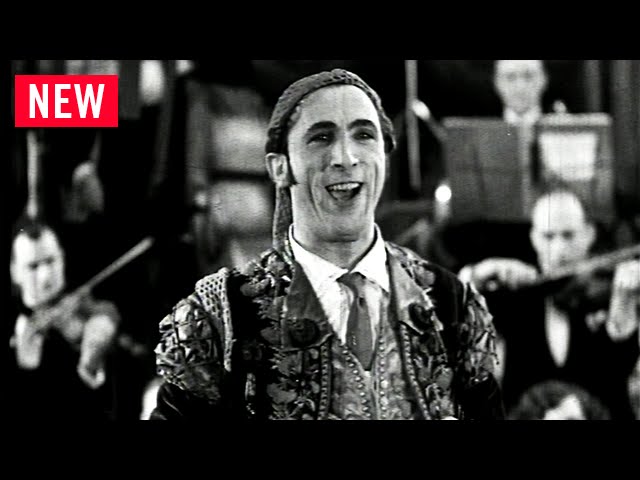 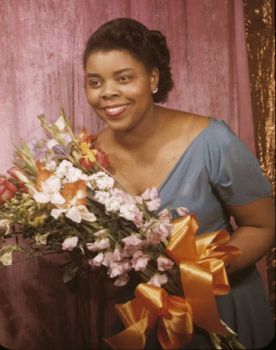 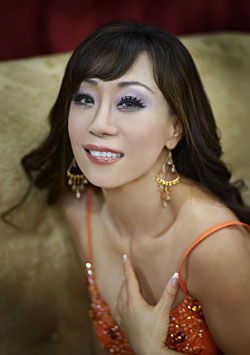
Mark Reizen Apollo Granforte!
Carol
Brice Sumi Jo
Saturdee Opry Links Overture:
Schwanda the Bagpiper! (Really.)
by Svanda Dudak.
https://www.youtube.com/watch?v=skxcUwqbHq4
1.
Saturdee Opry Links opens with a rarity by a rarity. This is the lovely,
tender "Angels Guard Thee" ("Berceuse"), from the 1888 opera, "Jocelyn," by
Benjamin Godard. It's about the only thing in the four-act work that is
still performed. Here with the wonderful Belgian lyric tenor, Andre d'Arkor,
who was very
popular in the '30's, notably with Mozart, and wound up spending his final
decades as director of the Théâtre Royal in Liege.
https://www.youtube.com/watch?v=43LW7oLFEZY&feature=youtu.be
Translation:
https://www.lieder.net/lieder/get_text.html?TextId=20844
Far from the noisy throng, by song birds lulled to rest,
Where rock the branches high by breezes soft carres'd;
Softly the days go on, by sorrow all unharm'd,
Thus may life be to thee a sweet existence charm'd.
2.
Apollo Granforte---real name!---was a basket case.
Literally. He was left on the doorstep of a hospital in a basket, when he
was two days old. The nuns at the Ospedale Civile in Legnano, Italy,
unwrapped the child to find a bonnet with a brass medal sewn to it,
apparently some good luck trinket. (It worked!) Noting his unusual size and
strong profile, the nuns named him Apollinare Granforte, which he would
eventually shorten to Apollo. He was soon adopted, eventually apprenticed as
a cobbler, but. . .you guessed it. . .could not stop singing. At 16 he
debuted as the
tenor in Donizetti's "Lucia di Lammermoor," put on by a small company that
traveled the countryside and performed in town squares---yet soon changed to
baritone. He married, emigrated to Argentina and spent many years singing in
South American opera companies---and also in Australia---before returning to
Italy (becoming a close friend of the composer, Mascagni), singing in
major houses there. Here is the only known footage of Apollo, from
Australia(!), doing the "Largo al Factotum" from "The Barber of Seville," by
Rossini, in 1932. I rather like his jolly choreography. "I am the topman of
the town!" Get your Figaro's ready.
https://www.youtube.com/watch?v=WxFOQVsE2Oo&feature=youtu.be
Translation:
https://en.wikipedia.org/wiki/Largo_al_factotum
3.
Here's another rarity done by a rarity. Apollo
Granforte does a boffo job on a less-than-boffo piece by Puccini. What?
Puccini wrote something bad? Well, something banal, anyway---undoubtedly for
the money. In 1919, he was commissioned to write music to an ode by one
Fausto Salvatori honoring, cough, cough, Italy's victories in World War I.
The work, "Inno a Roma" (Hymn to Rome), was to premiere on 21 April 1919,
during a celebration of the anniversary of the founding of Rome. It was
delayed, however, and made its ignoble debut a couple months later at a
gymnastics meet. (Eventually it was widely played during Fascist street
parades and public ceremonies.) Hope the pay was good, Giacomo. Anyhow,
listen as Granforte ("very strong") gives a winning, rousing air to the
thing. Very strong, indeed. Click this link:
https://www.dropbox.com/s/d0nccritj5coqkj/Granforte%20Hymn%20to%20Rome%20Puccini.mp3?dl=0
4.
A chestnut, to balance out the Puccini rarity of the
previous post. . .but sung in Fraanch, here is "M'appari," Lionel's aria
from "Martha," by Flotow---in a spirited rendition by, again, the
Beligan tenor, André d'Arkor.
Setting : A hunting park in Richmond Forest, England,
18th century during the reign of Queen Anne.
Synopsis : After meeting Lady Harriet the night before
disguised as "Martha", Lionel sees her again with the ladies-in-waiting for
Queen Anne. He is struck again by her beauty and grieves that he will
probably never be with her again.
https://www.youtube.com/watch?v=EQ1hMHbIUoM
Translation:
http://www.aria-database.com/translations/martha15_mappari.txt
5.
Carol Brice. Heard of her? Probably not. But she is a large part of opera
history. It was Brice, along with Marian Anderson and Mattiwilda Dobbs, who
broke the color barrier in the world of opera. A
contralto---the lowest vocal category available to female singers---Ms.
Brice
earned a BA in music from Talledega College in Alabama, and studied at
Julliard from 1939-43. A prodigy from an early age, this daughter
of a music educator toured the country with the a group called The Sedalia Singers (of
North Carolina) at thirteen. She would eventually sing at FDR's third
inauguration(!), and make a landmark recording of Mahler's "Songs of a
Wayfarer" with Fritz Reiner and the Pittsburgh (no, not Chicago) Symphony. She
appeared with many U.S. orchestras in the late '40's, then spent several
years of the early '50's in South America (where it is presumed she faced
far less discrimination.) She was in the first group of African-American
singers hired by Rudolph Bing at the Met in 1951---eventually singing the role of the Voodoo
Princess in Clarence Cameron White's "Ouanga," and later, Addie in Marc
Blitzstein's opera, "Regina." She spent many years touring with her piano
accompanist brother, Robert, and also sang in a number of Broadway shows and major orchestras before finally joining the
faculty at the University of Oklahoma. Here is an excerpt from her recording
of Mahler's "Songs of Wayfarer." This is "Wenn mein Schatz Hochzeit macht,"
or "When My Love Has Her Wedding Day."
https://www.youtube.com/watch?v=RR7a5yn8WLY
Translation:
https://www.oxfordlieder.co.uk/song/1081
More about Ms. Brice:
https://www.contraltocorner.com/carol-brice.html
6.
Verdi was deliberately emulating Shakespeare with the story in "Rigoletto."
To see the opera is to wonder if Shakespeare could have resisted such a
plot. Based on the Victor Hugo play, "Le roi s'amuse," it concerns the
beloved daughter of the hunchbacked court jester, Rigoletto. You should see
it! The music is magnificent. The gist: the womanizing Duke of Mantua,
genuinely falls in love with Rigoletto's daughter, Gilda (at least I believe
it so.) Gilda falls in
love with the Duke---ah, those twists of fate---and sacrifices her life to
save him from an assassin hired by, you guessed it, her father. The opera's
original title, "La Maledizione" (The Curse), refers to a curse placed on
both the Duke and Rigoletto by a courtier whose daughter the Duke has
seduced with Rigoletto's encouragement (trying to lure him away from his own
daughter.) I know, I know, who wants to watch anything so tragic? When the
music is this damn good, I do!
Here are two short passages. First, "Povero Rigoletto," in which the jester
gradually learns that his daughter has been abducted by several courtiers
and given to the Duke. When Rigoletto tries to get through them to find his
daughter, they will not let him pass and he releases his fury upon them in
"Cortigiani, vil razza dannata" (at 3:20.) Hell hath no fury like a jester
scorned. The baritone is Kim Dong-Kyu, who also calls himself Etttore
Kim---proabably in tribute to the great baritone, Ettore Bastianini, if
you're keeping score at home.
https://www.youtube.com/watch?v=WtEp_ixOdg8
"Povero Rigoletto" translation:
https://www.opera-arias.com/ver…/rigoletto/povero-rigoletto/
"Cortigiani, vil razza dannata" translation:
http://www.aria-database.com/search.php?individualAria=268
7.
Once upon a time, we were all young and vivacious. Well, maybe some of you
still are, so you are excused from this wistful post. You all know "Quando
M'en Vo," from Puccini's "La Boheme," but you are probably used to seeing it
acted as if the character, Musetta, is the sluttiest slut in Slutdom---with
beaucoup decolletage and sashaying ass-shaying. Such are the crummy trends
of our time, when all is overstatement, erring on the side of vulgarity.
Yes, I mean that in an overall context, not just opera. What of. . .holding
something back? Hinting? Well, here is Marguerite Piazza, a largely
forgotten soprano of enormous charm, with an example of how things Musetta, if
not things in general, used to be.
(Ms. Piazza, by the way, had a hell of an interesting life---growing up in
New Orleans, singing with the NYC Opera in the '40's, joining Sid Caesar's
"Your Show of Shows"---really!---in the '50's, singing with the Met. Once
the official spokeswoman for Camel cigarettes, she later fought off four
bouts of cancer and devoted all her later-life energies to raising money for
many charities. Married four times (!), she died at 92 of heart failure.)
https://www.youtube.com/watch?v=BX2MWGwcmrI
Setting: The Cafe Momus
Synopsis: Having spotted her occasional boyfriend, Marcello, Musetta sings
of the way everyone always notices her beauty when she goes out.
Translation:
http://www.aria-database.com/search.php?individualAria=34
SOL EXTRA!
Marguerite Piazza With Dino!
https://www.youtube.com/watch?v=MTR_P315LXg
"I sing to the last person in the audience, and I'm
more at home in front of an audience than I am anywhere else."
https://www.youtube.com/watch?v=pDXz_w22Ha8
8.
If Dolora Zajick had only played Azucena in Verdi's "Il Trovatore" ("The
Troubadour"), and nothing else, it would have been enough to establish her
as one of the standout mezzo-sopranos of her time. And she did make the
crazy witch her trademark, really, playing the part dozens of times over her
40-year career. Ms. Zajick retired recently, accelerated by the goddamned
COVID lockdown. Her final performance was to have been at the Metropolitan Opera in
spring of 2020, when she would have made her role debut as Kabanicha in
performances of Janáček's "Káťa Kabanová." Sic transit gloria mundi---well,
not really, as she had 40 years' worth. Here is the owner of an exceptional
"chest voice" (able to produce lower, thicker, and warmer tones) in her
debut as Azucena, back in 1988---a year that is, for no particular reason
other than it is very far from 2020, is looking better all the time. Is this
a scary gypsy or what? "The crackling flame fizzles!"
https://www.youtube.com/watch?v=VO66aVnLPRM
Setting: A broken down shack in the Biscay Mountains, 1409.
Synopsis: Azucena describes her mother's death to Manrico and the crowd of
gypsies. Her mother was burned on the stake for being a witch while the ones
who convicted her falsely laughed and enjoyed themselves.
Translation:
http://www.aria-database.com/search.php?individualAria=509
And just for fun, here she is in the same role in 2011:
https://www.youtube.com/watch?v=vufhNTU97JM
(Starts at 00:45 in.)
1988 in Metropolitan
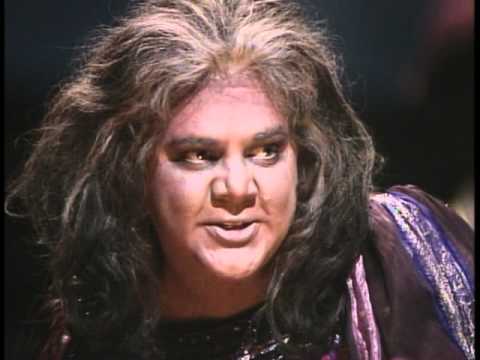
Dolora Zanjick Retires
https://www.operanews.com/Opera_News_Magazine/2019/9/News/Dolora_Zajick_Announces_2020_Retirement_from_Opera_Stage.html
More about Dolora:
https://www.dolorazajick.com/the-other-dolora/
9.
Well, here's a trifle, or perhaps truffle, just for fun. A little ditty by
Mozart, a little love poem by Johann Georg Jacobi, sung by the effervescent,
sparkly Sumi Jo. "An Chloe."
https://www.youtube.com/watch?v=XO9r7jwsSLw
Translation:
https://www.lieder.net/lieder/get_text.html?TextId=8812
FINAL BOW:
Well, it probably was this guy's final bow, seeing as he sang this at age,
uh, NINETY. Because we are now just a satellite of Russia, SOL thought it
apt to present the old Soviet-era bass-baritone, Mark Reizin, in an
astonishing performance of "Gremin's aria" from "Eugene Onegin,"
by Tchaikovsky. If it's a "stand-and-sing" performance, I think he is to be
forgiven! I hope to be able to stand at 90. Hell, I hope to be here at 90! Reizen was born into a Jewish family of mine workers in 1895 at
Zaitsevo village in Ekaterinoslav province (now Horlivka, Donetsk Oblast,
Ukraine). He served as a soldier in the First World War, studied engineering
at the Kharkiv Politechnic, and also voice at the Kharkiv Conservatory with
the Italian professor Federico Bugamelli in 1919–1920. He debuted at the
Kharkiv Opera in 1921 as Pimen in Mussorgsky's Boris Godunov, and sang this,
his last role, in 1985! You wouldn't know it, but this aria is a declaration
of Prince Gremin's great happiness at being married to Tatyana. Those
Russians are bleak even when they're happy!
Synopsis: The house of a rich nobleman in St Petersburg. Five years have
passed, during which Onegin has traveled extensively around Europe. Standing
alone at a ball, he reflects on the emptiness of his life and his remorse
over the death of Lensky. Prince Gremin enters with Tatyana, his wife, now a
grand, aristocratic beauty. She is greeted by many of the guests with great
deference. Onegin is taken aback when he sees Tatyana, and deeply impressed
by her beauty and noble bearing. Tatyana, in turn, is overwhelmed with
emotion when she recognizes him, but tries to suppress it. Gremin tells
Onegin about his great happiness and love for Tatyana, and re-introduces
Onegin to his wife. Onegin, suddenly injected with new life, realizes that
he is in love with Tatyana.
https://www.youtube.com/watch?v=kV-R4FvEEb0&feature=share
To be fair, here is is with the same aria, in his prime:
https://www.youtube.com/watch?v=Nk1zvFWX8V0
TRANSLATION:
Love is no respecter of age,
its transports blIss alike
those in the bloom of youth
yet unacquainted with the world
and the grey-headed warrior
tempered by experience!
Onegin, I shan't disguise the fact
that I love Tatyana to distraction!
My life was slipping drearily away;
she appeared and brightened it
like a ray of sunlight in a stormy sky,
and brought me life and youth, yes, youth and happiness!
Among these sly, poor-spirited,
foolish, pampered children,
these scoundrels both absurd and boring,
dull, fractious arbiters,
among the pious coquettes
and sycophantic slaves,
amid affable, modish hypocrisy
courteous, affectionate infidelities,
amid the icy censure
of cruel-hearted vanity,
amid the vexing vacuity
of calculation, thought and conversation,
she shines like a star
in the night's darkest hour, in a pure, clear sky,
and to me she always appears
in the radiant,
radiant nimbus of an angel!
SATURDEE OPRY LINKS ENCORE!
"I Bless You, Forests!"
If only more humans did. . .
Here is the great Russian baritone, Mark Reizen, with a
wonderful song by Tchaikovsky, using a poem by Tolstoy.
I bless you forests, valleys, fields of corn, hills,
rivers,
I bless you freedom and the blue sky!
https://www.youtube.com/watch?v=vrO6L5fzlSQ
Full translation:
https://www.oxfordlieder.co.uk/song/2394
Back to Opera Links
Back to Home Page
|



